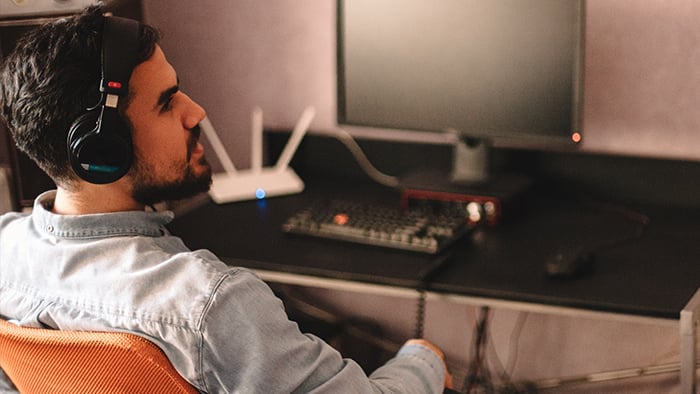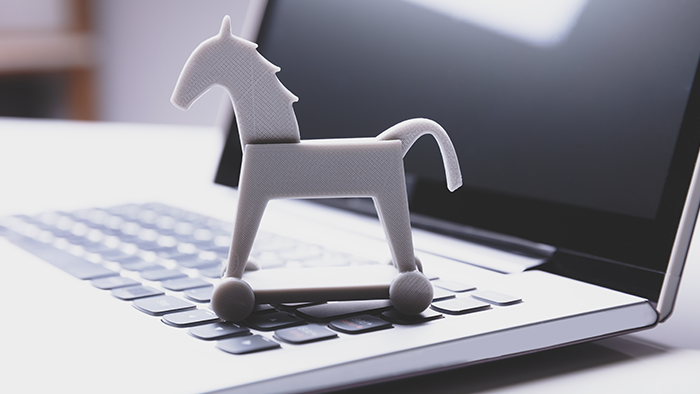Key takeaways
Tips to detect and remove spyware from an iPhone:
-
Look for spyware signs like overheating, strange messages or apps, and high data use.
-
Update iOS to the latest version.
-
Delete suspicious apps and clear your browsing data and history.
-
Perform a factory reset to erase all data from your device (back up important data first).
-
Use strong passwords and two-factor authentication.
-
Install a reliable security app and don't jailbreak your device.
Spyware for iPhones is a persistent threat. If you want to skip straight to the spyware removal steps, jump down now to find out how to remove spyware from an iPhone and get started immediately. But if you’re curious how that junk got on your phone in the first place, keep reading, because we've got answers.
How to remove spyware from your iPhone
iPhone spyware removal can be done by updating your software, removing suspicious apps, or performing a factory reset. Because spyware often stays hidden in an unknown file or discretely installed app, you may have to search hard to find it. Learning how to find spyware on an iPhone is only the first step – a spyware removal tool can help you detect and remove spyware from iPhones as well as other types of devices.
Update your software
Some iPhone spy software may exploit an iOS security flaw. Hackers are always looking for software vulnerabilities, which Apple regularly fixes via security updates. That’s why it’s so important to update your software to the latest iOS release.
An iOS update may also help you remove ransomware from your iPhone (or imitation ransomware, which is more common on iOS). Keeping software updated is one of the pillars of internet security no matter what device you have.
To know if you need to update to the latest iOS version look for red notification alerts on the Settings App, General tab, or Software Updates tab.
Here’s how to update your iPhone to get the latest version of iOS:
-
Open Settings, tap General, then tap Software Update.

-
Follow the prompts to Download & Install, Enter your passcode, and Agree to Terms and Conditions to install the update.

While this installs the latest updates, it doesn’t scan your iPhone for spyware or other malware. But when learning how to tell if spyware is on your phone, don’t skip any steps, and updating your iOS ensures you have the latest software installed, which will include any patches to known vulnerabilities.
Remove suspicious apps
If you see an app on your phone that you didn’t download, that app might be spying or otherwise recording your activity. You can delete the suspicious app on your iPhone by pressing and holding the app icon. Several options will appear. Tap Remove app (or Delete App, depending on your version of iOS) and confirm by tapping Delete app.

Each app will offer different choices after you press and hold the app icon to activate settings. But all apps have the Delete App option in red.
If you have a jailbroken iPhone, you have an increased risk of being exposed to unsafe apps sourced from third-party app stores like Cydia. Jailbreaking your phone and downloading unvetted apps will greatly increase the risk of an iPhone virus. Get rid of those shady apps immediately and learn how to remove malware from your iPhone.
Clear browsing data and history
When figuring out how to detect spyware on an iPhone, much of the same rules of desktop computers apply. Clear the cookies and cache generated by your web browser apps; there might be an errant file or two lurking in there.
Here’s how to clean the browsing data on your iphone:
-
Go to Settings, scroll, and tap on Safari.
-
Tap Clear History and Website Data.
-
Tap Clear History to confirm.

It’s a good idea to do this on your PC as well. It’s one of the best ways to prevent or remove viruses from your PC.
Perform a factory reset
If you’ve tried the steps above and you can’t get rid of the spyware on your iPhone, try performing a factory reset. A factory reset will erase all data from your device, so back up your phone using iTunes or iCloud before wiping it clean.
To make sure you completely remove the spyware, you’ll need to restore your phone from a backup created before the spyware was installed. If you use a backup made after that point, your restored phone will still be infected with the same iPhone spyware app. There’s no point in resetting your phone if you end up reinstalling the same spyware you’re trying to get rid of.
Here’s how to factory reset your iPhone:
-
Go to Settings, scroll, and tap General.
-
Select Transfer or Reset iPhone, tap Erase All Content and Settings, and then tap Continue to confirm.

Keep spyware off your iPhone
After learning how to detect and remove spyware from your iPhone, shore up your defenses with Avast Mobile Security, a comprehensive security app to keep your phone protected and your online life more secure.
Can someone spy on my iPhone?
Yes, a partner, parent, or even employer can gain remote, real-time access to your iPhone using spying software. Spyware can track your GPS location, record your keypad inputs such as credit card numbers and passwords, and monitor your calls, texts, app usage, emails, voice, and other personal data.
We don’t want to scare you or make you paranoid. When you ask yourself, “is someone spying on my iPhone?”, you can give yourself the best peace of mind by guarding against it — not blindly suspecting others. Your loved ones probably aren’t snooping, and even if they are, you can keep it from becoming a bigger problem by simply upping your security.
iPhone spyware can appear in the following general forms:
-
Typical spyware refers to malicious apps or software installed secretly on your device by a cybercriminal or even a government authority, like in the case of Pegasus spyware. This type of spyware tracks your activity and is usually controlled remotely.
-
iCloud spyware happens when a hacker or other shady person (like a suspicious partner) figures out your iCloud login details and starts snooping on your device.
-
Masque attacks are spyware programs that appear to be normal updates to reputable apps. But once they’re on your device, they begin recording your activity.
Pegasus spyware on iPhones
Pegasus spyware targeting iPhone users was developed by the technology firm NSO Group, which specializes in state-sponsored surveillance software. Pegasus shot to prominence in 2021, when Apple sued NSO amid allegations that Pegasus was targeting iPhone users. Further evidence has come to light suggesting that other governments have used Pegasus to target and compromise the devices of lawyers, journalists, whistleblowers, and others.
Pegasus spyware’s ability to conduct remote, zero-click surveillance of iPhones is a potent reminder of the privacy risk that spyware poses to all digital platforms — even iOS devices. Thankfully, there are ways to check if your iPhone is infected with Pegasus spyware.
Why is iPhone spyware so dangerous?
Spyware is monitoring software that tracks what you do on your phone. iOS spying software is often well-disguised (parental-control apps can function as a form of spyware), which makes it difficult to detect iPhone spyware. Spyware hides on your phone, recording your behavior, including your location, passwords, emails, texts, calls, etc.
Think of everything you do on your iPhone. Now imagine a stalker, hacker, cybercriminal, or even someone you know personally having access to all of it. That’s unsettling, to say the least.
 Spyware can track your location, passwords, emails, texts, calls, and more.
Spyware can track your location, passwords, emails, texts, calls, and more.
Spyware comes in many forms depending on the needs of the spy. Just like computer viruses, phone spyware comes in all shapes and sizes. The target device can be infected with adware that tracks your movements across the web, Trojan malware that poses as something useful but secretly logs your activities, or keyloggers that record what you type.
Apple has tried to update their security to block spyware, but like all devices, iPhones are still vulnerable. Pegasus spyware was installed through spear phishing attacks and by taking advantage of zero-day vulnerabilities in well-known iOS apps. Apple quickly released a security patch, but subsequent versions of the iPhone spyware found other ways to get in.
Even legitimate apps on the official App Store can be a Trojan horse for spyware, such as Adware Doctor, Exodus, and so-called parental controls apps like mSpy. Other iPhone spyware can come in the form of location-tracking apps that tell you where your friends and family are, like Life360 and similar apps. If someone uses a tracking app to monitor your activity surreptitiously, that can be a form of spyware.
How to tell if someone is spying on your iPhone
Wondering how to detect spyware on an iPhone? Let’s learn about iPhone spyware detection, and the most obvious signs to look out for.
 Overheating
Overheating
Well-functioning iPhones should not overheat. If your device feels unusually warm or hot, this may indicate someone is spying on your iPhone. Of course, spyware installation is not the only reason for an overheated phone, so don't panic.
You may just need to learn how to clean up your iPhone, and all devices can also benefit from removing unnecessary junk files and apps.
 Drained battery
Drained battery
Is your battery constantly dying? Spyware works behind the scenes 24/7 to spy on your digital activity. That's why a rapidly draining battery could be a sign of iPhone spyware. Ripping through data is normal if you stream video or play lots of online games, but if your battery’s draining at an unusually fast rate, that could mean you have spyware on your phone. Learn how to check for spyware on iPhone if this is happening to you.
 Unusual messages
Unusual messages
Are random pop-up messages appearing on your iPhone when you browse? Unsolicited ads might indicate spyware infiltration, as spyware is often bundled with adware. Disruptive messages may also come in the form of text messages, or app notifications if you’ve jailbroken your phone and installed apps from outside the App Store.
 Excessive data usage
Excessive data usage
Just as spyware will drain your battery, it will also deplete your data. Spyware uses your own mobile data to send out the information it collects on you. That means that you’re paying to send a stalker, hacker, or unwanted snoop data on your digital activities (and maybe even video and audio footage).
Find out how to clean your iPhone from spyware below and see if that does the trick. If your iPhone is slow for reasons other than extreme data usage, check out our guide to learn how to speed up your iPhone.
 New apps
New apps
Another way for spyware to get on your iPhone is through parents or suspicious partners secretly installing monitoring apps. If you find unknown apps on your phone that you don't remember downloading, that can indicate that someone else has access to your iPhone.
Any of the above symptoms could mean that iPhone spyware has slipped onto your device. But there may be other, more benign explanations, and ultra-stealthy spyware may not leave an obvious footprint.
 Poor performance
Poor performance
Poor performance usually goes hand-in-hand with overheating and a short battery life, but not always. A super slow iPhone might be a sign of spyware, so knowing how to check for spyware on an iPhone could speed things up while also improving your security.
A struggling phone is also a concern for Android users, too, so if you also have an Android device make sure you know how to remove a virus from Android as well as how to remove spyware from an Android.
The only way to know for sure if spyware or other malware is on your phone is to use a dedicated cybersecurity tool. Avast Mobile Security features award-winning threat detection that can help flush out even the very latest and most advanced privacy and security threats.
How to protect your iPhone from spyware
To ensure spyware stays off your iPhone, follow these basic steps to avoid infection and protect yourself from spyware infiltration.
Secure your phone against physical access
Spyware can be loaded onto your iPhone remotely via a malicious app, or physically if someone gains access to your phone. Use long and unique passwords for all your accounts and two-factor authentication to secure your personal data. Protect your device with a secure PIN, Touch ID, or Face ID, depending on which iPhone model you have.
Download a security app
If you want to protect your iPhone while browsing on public Wi-Fi or need to encrypt personal photos, check out our list of the best privacy and security apps for iPhones. To block annoying ads, use one of the best ad blockers for your iPhone.
A free iOS security app is a great way to protect your phone against spyware and other malware. And to keep your other devices safe, see our roundup of the best free antivirus software and pick the one that suits your device and needs.
Use strong passwords
Your security hinges on the passwords you choose; they play a huge part in blocking hackers, spies, and identity thieves. To protect your accounts and devices with long, unique, and difficult-to-guess passwords — follow our comprehensive guide to creating a strong password, and update your passwords regularly.
Turn on two-factor authentication (2FA)
Chances are fairly low that someone will gain access to one of your security credentials. Chances are obviously lower that they’ll gain access to two of them. That’s where two-factor authentication comes into play.
2FA is used as an additional verification step when logging into sensitive online services, like your Apple account, banking sites, or social media. It may already be activated for most of these — if you have to check your phone for a code when logging in, that means 2FA is already enabled on that account.
Use a VPN
A VPN is a godsend for those who want increased internet security and privacy. It scrambles your internet data and masks all of your online activity to anyone who isn’t physically looking at your screen. Combine it with the best internet security software to enjoy as much freedom and privacy as you can get on the internet.
Do not jailbreak your device
While it may be tempting to jailbreak your device, this will forfeit all the security and customer-service infrastructure of the iPhone, including Apple’s world-class team of endpoint detection and response experts who maintain the secure iOS “walled garden.” Do you really want to say “thanks, but no thanks” to that?
Back up your data
Backing up your files so you don’t lose them has been one of the golden rules since the advent of computers, but it’s also a good way to help shield yourself against the impact of spyware. Not only does it let you store sensitive data away from prying eyes, it also lets you wipe and restore your iPhone in the event that your device gets compromised.
Just remember, never use a backup that was made while spyware was already installed — the idea is to back up often so that you always have a safe restore point to fall back on.
Real-time spyware security for iPhone
Unwanted software is an uninvited guest. And spyware is a truly noxious type of threat. A strong iPhone security and privacy app can protect you from unknowingly sending out sensitive data about your activity, and it’ll give you peace of mind that your phone isn’t secretly logging your behavior.
Thankfully, one of the best cybersecurity apps for your iPhone is free. Avast Mobile Security for iOS offers comprehensive protection designed specifically for iPhones and iPads. Install it today.
FAQs
What is spyware?
Spyware is a form of malware used by hackers to spy on people while they use their computers and phones. Lurking silently in the background, spyware is designed to collect sensitive data such as your browsing activity, login credential, and credit card numbers and bank details, which may then be sold to third-parties or used to commit further cybercrimes.
Can spyware be removed?
A dedicated security app with a spyware removal tool can remove spyware from your iPhone and wipe other malware from your iPhone too. Updating iOS and removing any unknown or suspicious apps will also help to secure your phone.
Does a factory reset remove spyware?
Restoring your iPhone to its factory settings will wipe it completely clean, removing spyware and other malware in the process. But unless you backed up your iPhone prior to the infection, a factory reset will result in all your data being lost. Performing a factory reset is a last-resort, and not a substitute for a malware removal tool if you think your phone may have been hacked.
What is the best anti spyware for an iPhone?
Avast Mobile Security for iOS is designed to guard against the full range of device-specific malware and other threat types, making it one of the best free antivirus apps for the iPhone.
Does Apple have anti spyware?
Yes, Apple has measures to protect against spyware – but they aren’t perfect. Additional apps can guard against someone remotely installing spyware on an iPhone.
Can someone hack your phone camera?
Once spyware has infected a phone, it can be used to access all device features — including the camera. To prevent hackers spying on you, protect your iPhone with free iOS security, and set up a VPN to encrypt your internet connection. Downloading a VPN on your PC or any other devices linked to your phone, as well as taking extra precautions on public Wi-Fi will also help to keep you safe.
How do I know if someone is tracking my phone?
You can find out how to tell if spyware is on your iPhone by watching out for the signs, like an overheating phone, poor performance, unfamiliar apps, and strange pop-ups. You can also download apps that search for malware and detect suspicious connections being made to your phone.
Can iPhone spying software be installed remotely?
Hackers don’t need to be physically present to sneak spyware onto your phone — it can be installed remotely via malicious apps, links, or scareware downloads. That’s why taking precautions to help you stay safe online is so important. Always check if websites are safe, beware of fake apps, don’t click on unknown or suspicious links, and protect yourself with a top-rated privacy and security app.
Can iPhones get viruses?
Theoretically, iPhones can get viruses, but the highly restrictive iOS infrastructure makes them vanishingly rare. So while you don’t really need to worry about viruses and worms, iPhones are still susceptible to malware other than viruses. Always use an iOS security app to detect and remove ransomware, spyware, and other malware. And remember that Mac computers can get viruses, too.
How do I find hidden apps on my iPhone?
Apps can be hidden from your home screen, but you can find them by swiping all the way to the right until you get to the App Library and scrolling through all the apps shown there. Tap App Library at the top to see all the apps listed in alphabetical order.
If you find any suspicious or unfamiliar apps, delete them immediately — you can always reinstall them later if you realize you made a mistake.
Can someone mirror my iPhone?
Yes, someone can use mirroring techniques to watch what you’re doing on your iPhone screen in real time. And without an iOS security app watching your back, it might be totally undetectable. Killing the connection by turning on Flight Mode will stop the mirroring until you turn your internet connection back on again, giving you time to locate and block the person snooping on you.








 Spyware can track your location, passwords, emails, texts, calls, and more.
Spyware can track your location, passwords, emails, texts, calls, and more.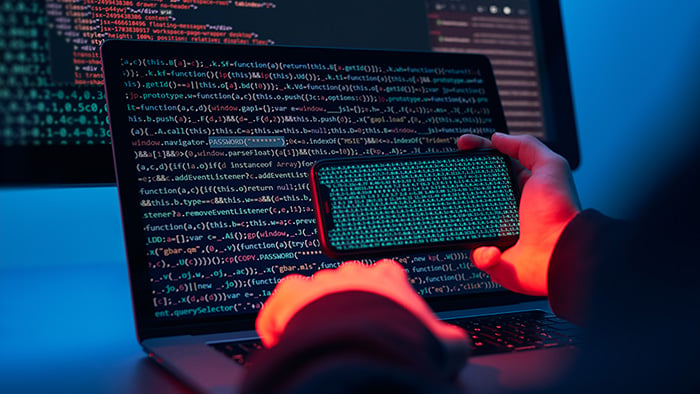

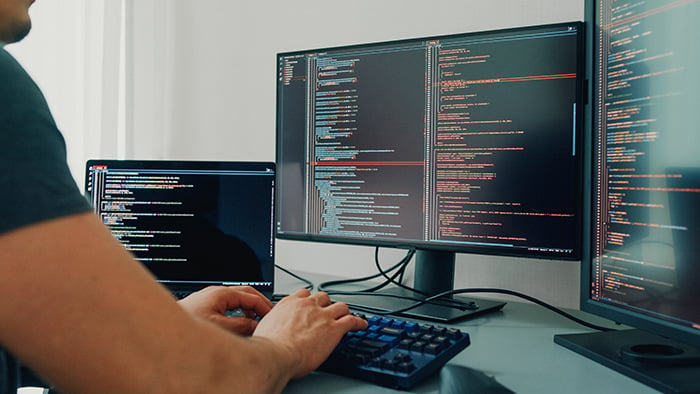
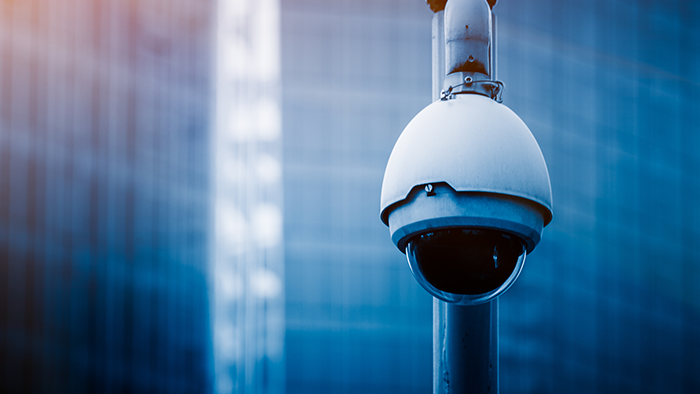
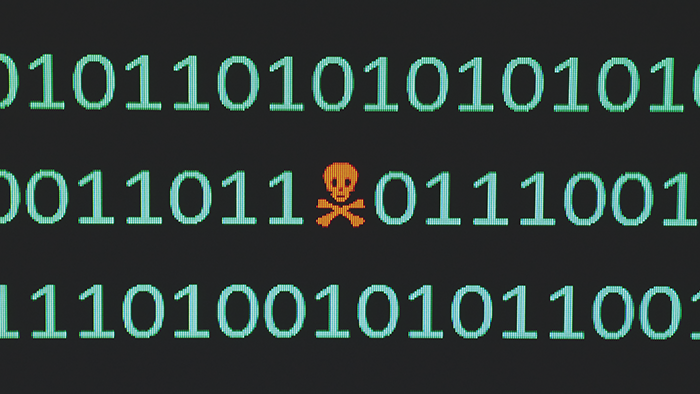
/What-is-scareware-and-how-to-remove-it-Thumb.jpg)




